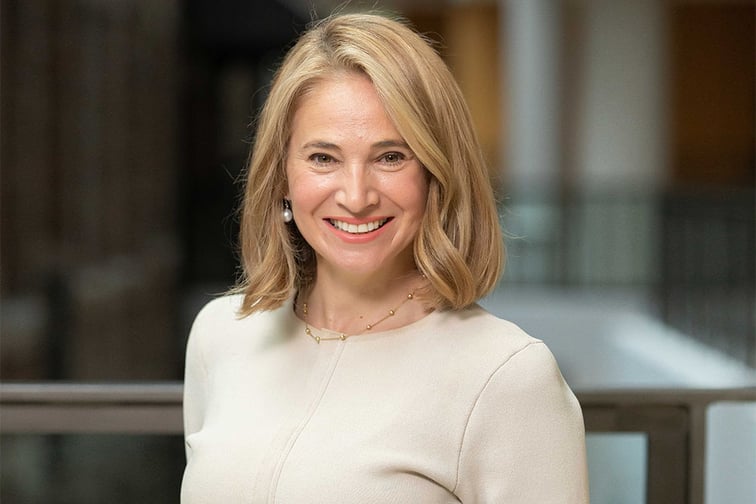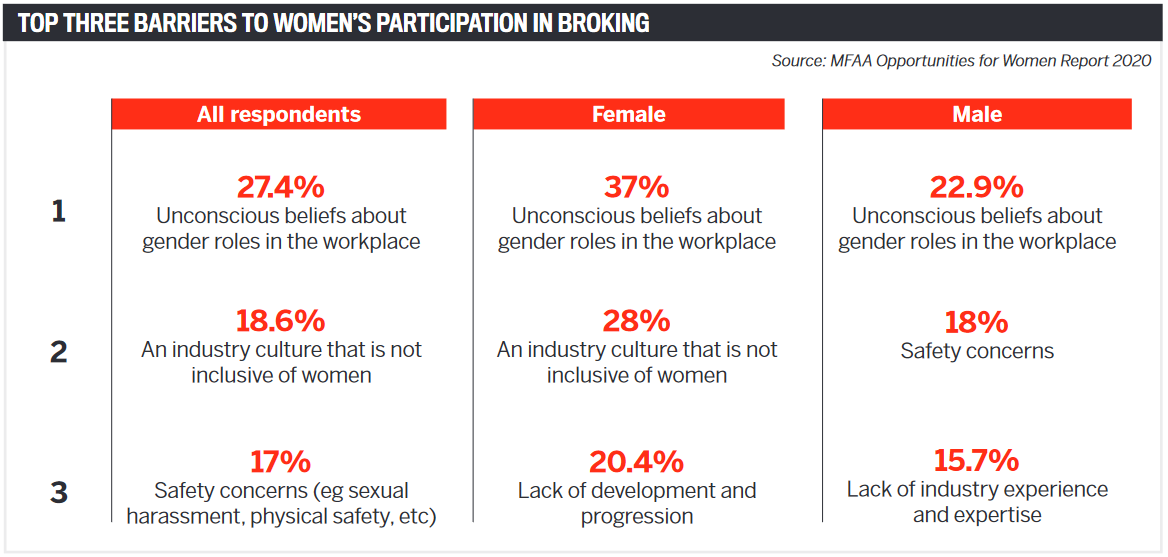

Boosting the number of women in broking continues to be a challenge for the industry, but awareness is growing and progress is being made through initiatives such as the ANZ Doyenne Program.
When it comes to championing women in finance, Simone Tilley doesn’t just talk the talk. ANZ’s general manager of retail broker backs her words up with actions.
In 2018, Tilley helped set up the ANZ Doyenne Program, which provides a platform for female brokers to lift the representation of women in the media. As a senior female executive, she is in a prime position to promote greater female participation in broking, as well as media coverage. Tilley is the only female broking head at one of the big four banks and is responsible for about 60% of ANZ’s Australian mortgage flows.
For the second year, Tilley has been named one of MPA’s Mortgage Global 100, which recognises leading mortgage influencers who are helping to drive positive change in Australia, New Zealand, the UK, the US and Canada. She is also chair of the Combined Industry Forum and direct liaison with the Australian Treasury and ASIC on behalf of the industry, a director of the LIXI board (a data standards organisation) and group chair of ANZ Sustainable Households.
Tilley has been in the finance industry for 25 years, with 11 of those spent at ANZ.
“I began my journey in agribusiness, lending money to farmers,” she says. “It was a very male-dominated domain at the time. In many cases I was the first female bank manager the farmers had had in their lives.”
Despite all her accomplishments, Tilley says the highlight of her career has been her “enduring relationships – not only within the bank but, importantly, with customers and others within the industry”.
“The key is being authentic and acting with integrity over an extended period of time.”
Tilley says her mother was one of her most significant role models.
“My mother was an entrepreneur and the first woman in Australia to start her own label adhesive flexographic business.
“She was fearless – no mountain was ever too high. We outgrew seven factories in 17 years. She was a continuous learner, read widely and surrounded herself with exceptional people. I learnt a lot at an early age from the courage and determination she exhibited.”
Inspired by her mother, as a young adult Tilley ran her family’s manufacturing business and started her own packaging business, which was later sold to a multinational.
Tilley is passionate about greater female representation in finance, particularly at senior levels.
“For ANZ, it is more than just an issue of gender equality; it’s about accessing the talent, markets and economic opportunities that gender equality brings,” she says.
“It makes sense for our workforce to reflect the communities we serve. This will help us unlock opportunities through better serving our communities and female customers.”
Improvements are occurring, Tilley says, pointing to Oliver Wyman’s latest Women in Financial Services 2020 report, which shows that the rate of progress in financial services has outpaced that of other industries.
“Australia’s major financial services firms have the second-highest representation of women on executive committees in the world. But globally, 20% of women on executive committees and 23% on boards, in my view, is still not enough. If we want more than incremental change, we need to move the needle at the more senior and influential levels.”
The MFAA’s latest Opportunities for Women report shows that the number of female brokers continues to fall, with 604 fewer female brokers in March 2020 than in April 2017.
Tilley says the report identifies what women regard as the top three barriers to entering the finance industry: unconscious biases, an industry culture that is not inclusive of women, and a lack of development and progression.
“Although more work is needed to address the causes of these barriers, I think there has been positive change delivered through greater awareness and education. There is now an emerging group of inspirational female brokers who are courageously sharing their own stories as to how they have overcome traditional barriers. In some cases, the barriers were themselves and not believing they could take the next step.”

Creating and investing in programs that support women as they progress in their careers remains essential to retaining female brokers, says Tilley.
“The importance of sponsors and peer-to-peer networks has proven to be instrumental in the way women feel supported, particularly at times when they may be at a critical turning point in their business and require independent reassurance.
“While the needs of men and women with respect to running a business are very similar, given the strong disparity in the industry, some women are naturally daunted by the lower representation and perhaps curious as to how they will be set up for success.
“The media also has an important role to play, actively seeking out a balanced voice across a wide spectrum of the market so the market sees and, most importantly, values equality.”
Tilley says mortgage broking can be a rewarding career, and there are many successful female brokers.
“Through a number of targeted initiatives such as Industry Influencers, Champions of Diversity and ANZ’s own Doyenne Program, the industry has raised the visibility of these successful female brokers.
“If we continue to focus on empowering and encouraging women who are already in the industry, this could boost the numbers.” The pandemic has also created greater flexibility for women.
“I think COVID-19 has enhanced everyone’s understanding of it – that flexibility comes in all shapes and sizes and is for everyone,” Tilley says.
“This is a real positive for gender equality, because we know supporting men to work flexibly enables women's increased participation in the workforce, a key to achieving gender equality.”
The pandemic has changed how people work, accelerating digitisation.
“And like many industries, there needs to be a renewed focus on ways to promote inclusion in a remote working environment so people feel valued and connected. These aspects will go a long way in supporting women to deliver outcomes in a way that works best for them, both personally and professionally.”
The cornerstone of ANZ’s push to raise the profile of women is its Doyenne Program, which begins its 2021 program this month.
Tilley says when she started in her role as ANZ’s head of retail broker five years ago, there were “virtually no women” featured in industry magazines, something she found “confronting and disappointing”.
“It prompted me to take action and actively address this gap – provide support, tools and encouragement to prominent women already running established and respected businesses.
“Our idea was threading prominent female business brokers with the journalists so they could build trust and rapport. The product of that has been a ripple effect of change.”
‘Doyenne’ is a French feminine word meaning most prominently respected woman in a particular field. New doyennes (female brokers) are recruited each year and take part in a series of learning events to build skills based on developing their profiles, raising visibility and networking.
“I’m proud to say it has delivered incremental change, including improved balance in broker media,” says Tilley.
The ANZ Doyenne Program is run in partnership with Notable Media journalist Amanda Gome, former CEO of Crikey and publisher of BRW magazine and Smart Investor.
Participants take part in Zoom sessions in June, July and August. Doyenne alumni remain in the program and network and share best practices with other doyennes, including new recruits, during ‘Lunch and Learn’ sessions in September and October. The program’s goals include:
ANZ has other programs to drive change, such as Notable Women and Employee Networks, and partnerships to support gender balance.
“Our education program includes new-to-industry training and ongoing training tailored to brokers across the life cycle, so we are able to support new female recruits and continue to support females as they develop in their career,” says Tilley.
“Our own teams that serve brokers, our BDM community, are relatively balanced across Australia also.”
Tilley says industry leaders also need to consider the effect of policies and practices on the workforce and customers. “We need to be intentional in our decision-making to consider whether they disproportionately or adversely impact women, and role-model the dialogue around this.
“We also need to shift the narrative to highlight the economic benefits of diversity. By reinforcing the value that women add to the industry, we are better equipped to drive respectful cultural change at scale.”
Tilley says there is substantial research on the benefits of diversity, including helping companies better understand and serve their customers.
“It can improve business outcomes, increase profitability and strengthen governance, problem-solving and decision-making processes by fostering a culture of innovation, creativity and curiosity. Research has shown that organisations that invest in diversity outperform organisations that do not.”
